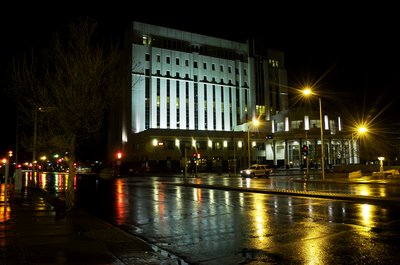 This is the Bernalillo County Metropolitan Courthouse. It is in the center of a political storm, the likes of which this community may never have seen.
This is the Bernalillo County Metropolitan Courthouse. It is in the center of a political storm, the likes of which this community may never have seen.The Federal Bureau of Investigations completed an investigation last summer into allegations of improprieties in the construction of this building and possibly the State District Court.
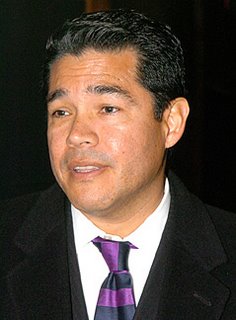 The then U.S. Attorney David Iglesias, right, a Senate confirmed political appointee, who had been recommended by N.M. Sen. Pete Domenici to President George W. Bush in 2001, sought and obtained indictments before a federal grand jury that have been placed under seal by the court while the criminal investigation continues.
The then U.S. Attorney David Iglesias, right, a Senate confirmed political appointee, who had been recommended by N.M. Sen. Pete Domenici to President George W. Bush in 2001, sought and obtained indictments before a federal grand jury that have been placed under seal by the court while the criminal investigation continues. Iglesias was asked to resign on Dec 7. Serving at the pleasure of the president, he stepped down and left office at the end of last month.
Department of Justice had released eight U.S. Attorneys from around the country. In seven cases, Justice officials cited performance failures as the reason for the dismissals. San Diego Based U.S. Attorney Carol Lam, who had successfully prosecuted Republican Rep. Randy “Duke” Cunningham for corruption, was also released. In the eighth case, H.E. "Bud" Cummin was removed to make room for Tim Griffin, a former aide to top presidential political advisor Karl Rove. The Washington Post reports that Griffin will not seek appointment to the position.
 Iglesias charged that his departure was due to political pressure applied by N.M. Republicans Rep. Heather Wilson, left, and Domenici in trying to spur the release of the sealed indictments prior to the November 2006 election. Wilson was running behind in the polls to her challenger, Democratic New Mexico Attorney General Patricia Madrid.
Iglesias charged that his departure was due to political pressure applied by N.M. Republicans Rep. Heather Wilson, left, and Domenici in trying to spur the release of the sealed indictments prior to the November 2006 election. Wilson was running behind in the polls to her challenger, Democratic New Mexico Attorney General Patricia Madrid. Iglesias said he would not have broken his silence if Justice officials had not attacked his office and the professionalism of his career staff.
Iglesias testified Tuesday before the Senate Judiciary Committee and the House Judiciary Subcommittee on Commercial and Administrative Law. The judiciary committees are looking into the independence of the U.S. Attorneys.
Wilson and Domenici had made phone calls last fall that Iglesias would later feel were inappropriate attempts to exert influence in releasing the sealed indictments. This was just prior to the election. Iglesias felt it might have been an effort to help Wilson in the election, which she eventually won by less than 900 votes.
According to Iglesias, Wilson asked specifically about the sealed indictments and Domenici wanted to know if they would be released prior to November.
The congressional contacts could be considered violations of the law as interference in the administration of or obstruction of justice. Ethics complaints in both houses of congress are sure to ensue and will take their course.
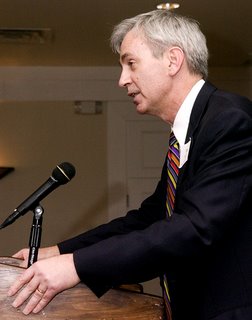 Republican attorney Pat Rogers, right, who is a major supporter of Wilson, is shown here introducing her at Domenici’s recent announcement running for a seventh Senate term. According to the Albuquerque Journal, Rogers said that he had met Iglesias in October and thought he was out of touch with the community’s questions of why Iglesias was not moving forward.
Republican attorney Pat Rogers, right, who is a major supporter of Wilson, is shown here introducing her at Domenici’s recent announcement running for a seventh Senate term. According to the Albuquerque Journal, Rogers said that he had met Iglesias in October and thought he was out of touch with the community’s questions of why Iglesias was not moving forward. So what’s wrong with this picture?
Sealed indictments during an on-going investigation. What can that mean?
Law enforcement officials and lawyers generally understand the underlying meaning of sealed indictments, but the layman might not. An indictment is a formal criminal charge brought as a result of a grand jury that convenes in secret.
A Grand Jury has two tasks: to determine, using the test of probable cause, that a crime has been committed, and that a particular person probably committed the crime. On a scale of one to 100, probable cause may represent as low as a 35 percent probability of guilt. A conviction of a criminal case requires proof beyond a reasonable doubt, or somewhere in the high 90-percentile level.
A prosecutor may have reason to believe that one or more persons are involved in a crime. Law enforcement officers might be able to gather sufficient evidence to indict one or more suspects. However, they might not have enough evidence to charge others who are believed to be involved.
In the hypothetical, let’s take a public corruption scenario. Indictments with sufficient evidence are obtained for minor crimes or for low-level co-conspirators. There is some evidence, but not enough to indict others, who maybe even higher-level participants, the main conspirator or the target of the initial investigation.
If the low-level co-conspirators are publicly identified, the ability to pursue the higher level offenders may be compromised.
The prosecutor is not the only player in the decision to seal indictments. There is a judge, usually the one supervising the grand jury, who actually seals the indictment. The prosecutor is required to explain the need for sealing the indictment to maintain secrecy during the ongoing investigation.
Keeping the earlier obtained indictments under seal allows for law enforcement or the prosecutor to continue the probe.
In this case, there is a great deal of speculation, rumor and even some evidence revealed through court documents, of the width and breadth of the investigation and some of the parties involved.
A list of some of the rumored alleged participants might read like the who’s who of the local Democratic Party.
Local Republicans, their operatives and bloggers seemed to salivate at the prospect of having a Republican U.S. Attorney leading the prosecution against Democratic rivals.
 Iglesias had indicted two, back-to-back Democratic State Treasurers, Michael Montoya and Robert Vigil, on charges of public corruption including soliciting and collecting bribes, kickbacks and racketeering. Several other co-conspirators were indicted and entered plea agreements to one count only in exchange for their testimony against Vigil.
Iglesias had indicted two, back-to-back Democratic State Treasurers, Michael Montoya and Robert Vigil, on charges of public corruption including soliciting and collecting bribes, kickbacks and racketeering. Several other co-conspirators were indicted and entered plea agreements to one count only in exchange for their testimony against Vigil.Vigil was tried and a jury was unable to come to a unanimous finding when a lone juror was not convinced of his guilt. A mistrial was declared and a retrial scheduled.
 Then Democratic New Mexico Attorney General Patricia Madrid, right, stated her displeasure with the plea arrangements and indicted the co-conspirators. She did not indict Vigil.
Then Democratic New Mexico Attorney General Patricia Madrid, right, stated her displeasure with the plea arrangements and indicted the co-conspirators. She did not indict Vigil.Madrid, the Democratic candidate for the N.M Congressional District 1 seat held by incumbent Wilson, had not waived state immunity. In such cases both the state and federal governments may independently prosecute. The lack of state immunity and the state indictments made prosecution difficult for the U.S. Attorney. The co-conspirators were unwilling to cooperate in the federal case because their testimony could be used against them in the state’s prosecution.
Republicans cried foul.
At the retrial, Vigil was convicted of a single count of the 24-count indictment. He was convicted of attempted extortion and received a three-year sentence to federal prison.
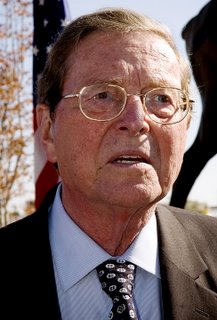 The blogging world and Republican operatives seem to want to make a great deal about the fact that the courthouse indictments remain sealed. They seem to ignore the context that there is an ongoing criminal investigation. Some bloggers, who have a history of spinning for the Republicans in general and Wilson in particular, have reframed the issues into attacks on Iglesias and Madrid, in an effort to deflect responsibility that belongs to Wilson and Domenici, left. There is plenty of blame to go around. Iglesias failed to notify his superiors of the contacts. He told congress it was a mistake borne of a misguided sense of loyalty to his mentor, Domenici, and political ally Wilson.
The blogging world and Republican operatives seem to want to make a great deal about the fact that the courthouse indictments remain sealed. They seem to ignore the context that there is an ongoing criminal investigation. Some bloggers, who have a history of spinning for the Republicans in general and Wilson in particular, have reframed the issues into attacks on Iglesias and Madrid, in an effort to deflect responsibility that belongs to Wilson and Domenici, left. There is plenty of blame to go around. Iglesias failed to notify his superiors of the contacts. He told congress it was a mistake borne of a misguided sense of loyalty to his mentor, Domenici, and political ally Wilson. It seems that the operatives believe that the sealed indictments represent a complete and fully prosecutable case. Perhaps they feel that, upon their revelation, all the alleged offenders should immediately plead guilty to every count, which would result in a political implosion.
Iglesias’ office successfully prosecuted the state treasurer scandal. Republicans admittedly are disgruntled with the lack of more felony convictions and longer sentences.
One has to wonder what the Republicans state of mind would be if the sealed courthouse indictments revealed only some low-level functionary and the big fish would then be able to capitalize on the opening of the charges and avoid prosecution all together.
The possibility of not making a successful case against the perceived high-level Democrats rumored to be involved in the courthouse investigation, because of a premature release of indictments, would surely cause a greater outcry than currently exists.
The actions by Wilson and Domenic may be perceived and argued by those eventually charged in the courthouse case that allegations were politically motivated.
The U.S. Attorney will again have an unnecessary complication to overcome.
Iglesias testified at the House Judiciary Subcommittee that, when interviewed by then Attorney General John Ashcroft, he was told that politics stops at the door.
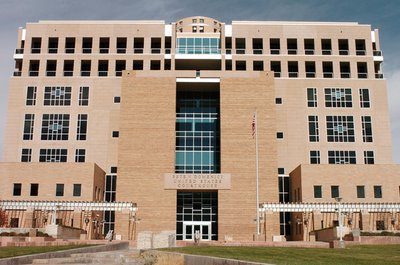 What would be the irony if Domenici were to have to go through the door of the federal courthouse in Albuquerque that bears his name?
What would be the irony if Domenici were to have to go through the door of the federal courthouse in Albuquerque that bears his name?
No comments:
Post a Comment